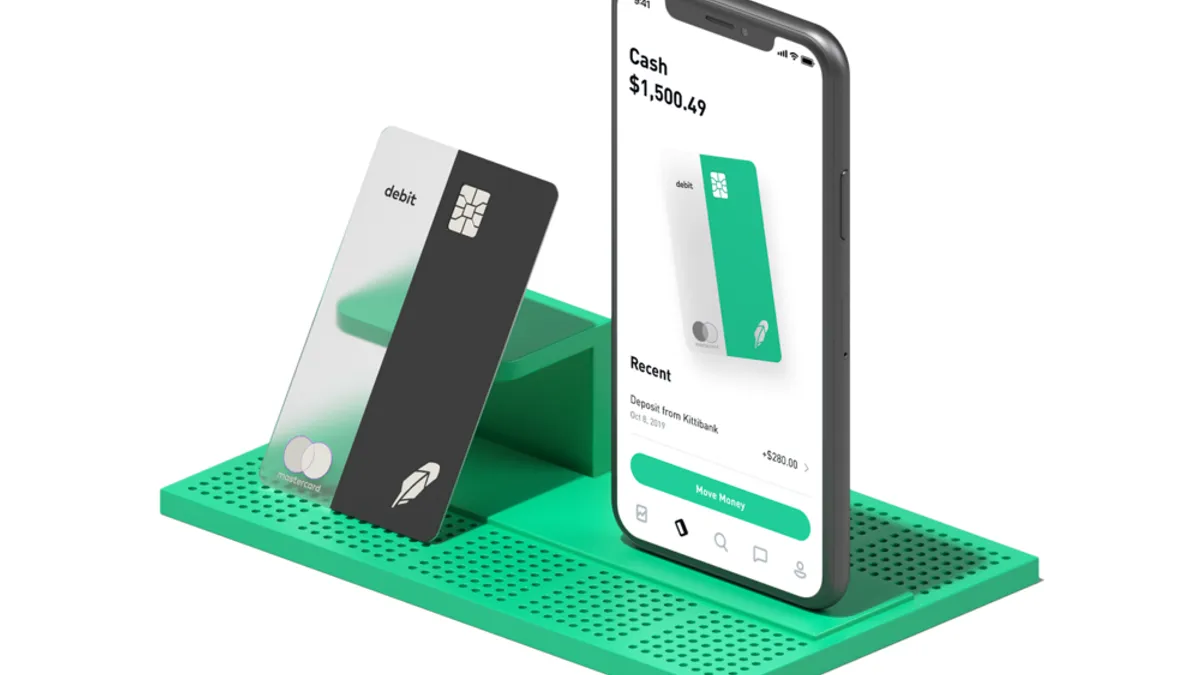Dive Brief:
- Robinhood Markets faces a civil fraud investigation and a potential fine of more than $10 million from the Securities and Exchange Commission (SEC) for failing to disclose until 2018 that it sold its clients' orders to high-speed trading firms, sources told The Wall Street Journal.
- Payment for order flow, as the practice is called, creates a conflict of interest for the broker that sells the orders and has generated concern among detractors that it could help traders exploit inexperienced investors, among whom Robinhood has gained popularity. Brokers and traders assert those claims are baseless.
- Robinhood earned less than half of its revenue in 2017 from payment for order flow and about half in 2018, a person familiar with the matter told the Journal.
Dive Insight:
The specter of regulatory action could be seen as the latest in a string of blows to the startup's reputation in a year in which the pandemic has helped Robinhood boost its trading app's client base past 13 million accounts. About three million of those have opened since the end of 2019, eclipsing gains by competitors E*Trade, TD Ameritrade and Charles Schwab, Bloomberg reported.
Robinhood in December pulled its banking charter application with the Office of the Comptroller of the Currency (OCC), and in July indefinitely postponed a plan to launch its app in the U.K. by the end of the year. The company also suffered a series of outages in March that left traders unable to access the platform on a day when the Dow Jones Industrial Average posted its greatest percentage gain since 2009. The mishap spawned a class-action lawsuit and a controversial offer by the company — a $75 goodwill credit that an attorney for the plaintiff saw as hush money. And in June, a 20-year-old day trader who thought he had racked up a negative $730,000 cash balance mentioned the company in his suicide note.
Until October 2018, a page on Robinhood's website listed two revenue sources: fees for its margin-trading service and interest collected on customer deposits. It didn't mention payment for order flow, although regulatory disclosures elsewhere on the site detailed the practice.
"The revenue we receive from these rebates helps us cover the costs of operating our business and allows us to offer commission-free trading," Robinhood's co-founder Vladimir Tenev wrote of the company's payments from high-speed traders, in an October 2018 blog post.
New SEC-mandated disclosure reports show Robinhood made $271 million in revenue from electronic trading firms in the first half of 2020, according to the Journal. About $180.1 million of that total came in the second quarter, Bloomberg reported, citing a regulatory filing. That means the company's take from payment for order flow doubled between April and June, compared with the previous three months.
The SEC, in an August report about algorithmic trading, acknowledged payment for order flow often results in slightly better prices for individual investors. To the user, the difference between trade prices with an electronic trading firm and on an exchange may be a fraction of a cent per share. But that adds up to billions of dollars in savings across Robinhood's small-investor client base, analysts told the Journal.
A settlement between the SEC and Robinhood may likely assert the company should have known its omission of payment for order flow from its declaration of revenue sources was misleading, a source told the Journal. A deal is not likely this month, and a proposed fine has not been negotiated, the publication reported.
"We strive to maintain constructive relationships with our regulators and to cooperate fully with them," a Robinhood spokeswoman said in a statement. "We do not discuss or comment on our communications with our regulators."
An SEC spokeswoman declined to comment to the Journal.
This wouldn't mark Robinhood's first enforcement action related to payment for order flow. The company in December paid the Financial Industry Regulatory Authority (FINRA) $1.25 million as part of a settlement in which the regulator said the company didn't ensure it was getting the best prices for customer orders between October 2016 and November 2017.
The SEC and FINRA are also investigating Robinhood's response to its March outages, Bloomberg reported Monday.













